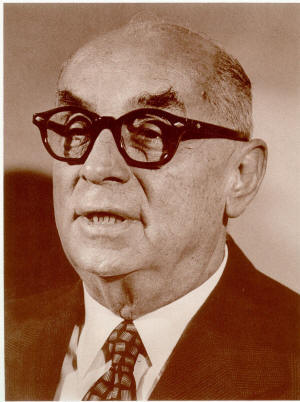
Mahmut Celâl Bayar
Statesman - Politician - President of Turkish Republic
16 May 1883 - 22 August 1986
Celal Bayar occupies a monumental place in Turkish Political History -- as one of the founders of the Turkish Republic, the hero of the National Unity movement, leader and implementer of the Turkish economy, and as a great statesman.
EARLY LIFE
Mahmut Celal's family emigrated from Plevne, Bulgaria to Umurbey, Turkey during the Turkish-Russian war (1877-1878) as the Ottoman Empire was declining. His father, Abdullah Fehmi Efendi, was the Headmaster of the Berkofca School of Islamic Sciences in the Tuna province of Bulgaria. In Umurbey the Ottoman Ministry of Education appointed him Headmaster of the Bursa-Gemlik-Umurbey School system. After Fehmi Efendi's eldest son, Behzat, died while in the Military Academy in Edirne, and his second son died from malaria while in the Naval Academy, he decided to keep his third son, Mahmut Celal, in Umurbey, tutoring him in Arabic and Persian.
BANKER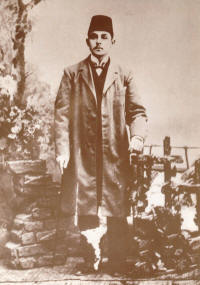
After completing his higher education in Umurbey, Mahmut Celal worked at the Gemlik judicial courts and Administration departments, then went to Bursa to work at the Ziraat Bank. While at the Ziraat Bank he studied at the Silk Cultivation and Textile school and learned French at the Bursa branch of the "College Francaise de L'Assomption.” In 1903 he married Reside Hanim, the daughter of Inegollu Rafet Bey, and his first son, Refi, was born in 1904. In 1905 he successfully completed the entrance examinations of the "Deutsche Orient Bank," proved his exceptional abilities, and rapidly rose to become a high executive.
HERO OF THE UNITY MOVEMENT
In 1907 at the urging of the Lieutenant Governor of Bursa, Hamza Bey, he joined the Party of Union and Progress and performed tasks that were vital to the activities of the party. During the 31 March 1909 uprising of the fanatic religious soldiers in Istanbul he formed a volunteer company to prevent its spread to Bursa.
During the Balkan Wars (1912-1913), in which the Ottoman Empire lost substantial territory, the Greeks deployed their militant priests and successfully captured Macedonia. In World War I they attempted to employ the same tactics to capture the coastal areas and strategic Aegean centers from Mudanya to Fethiye. During this critical time the Party of Union and Progress assigned their trusted member, Mahmut Celal Bey, to the Izmir region, where his astute political and military defense activities in the Izmir region laid the foundation for the failure of the Greek master plan to capture the entire Aegean Region.
In
cultural activities Mahmut Celal founded the National Library, expanded the
Higher Education School of the Party of Union and Progress and contributed
to the dissemination of new concepts for the advancement of the people. In
Izmir he founded the "Towards the People" society and published a newspaper
of that name, calling on the people to unite against the foreign occupation.
The Ottoman Cabinet later closed this newspaper and issued an arrest warrant
for Mahmut Celal.
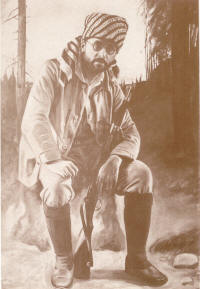
In 1918, during the World War I armistice, he founded the Society for the Protection of Ottoman's Rights and was the first person to propose armed resistance to the allied occupation of the Aegean region. His wife, Reside Hanim, encouraged him in these activities. The Ottoman cabinet considered these activities rebellious and sent a company of soldiers to capture him. After Odemis and Tire were occupied by the Greeks, Mahmut Celal took refuge in the Dagyenice village near Germencik, taking the pseudonym of Galip Hoca, while continuing the resistance to the occupation. With the assistance of Yoruk Ali his forces took Aydin back from the Greeks. Together with Demirci Efe he formed groups of resistance fighters. At the request of the elders of the region he accepted the leadership of the resistance movement, becoming Regimental Commander of the Akhisar Front.
A FOUNDER OF THE TURKISH REPUBLIC
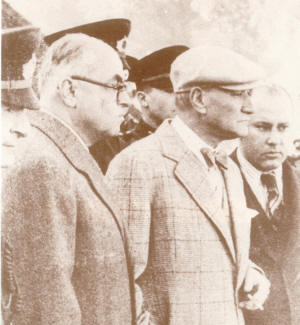 Mahmut
Celal was elected to the last Ottoman Parliament as a member from Manisa. He
and his nationalist colleagues proposed the establishment of a Turkish
national boundary. These nationalist movements, started by Mahmut Celal, and
the occupation of Istanbul by the Allies in 1920 led the Sultan to dissolve
the Ottoman Parliament and order the arrest of all nationalist members of
parliament. Mahmut Celal had to flee Istanbul and, at the invitation of
Ataturk, went to Ankara to join the First Parliament of modern Turkey. His
close association and friendship with Ataturk lasted until Ataturk's death.
In his Great Speech to the Nation in 1927, Ataturk praised Mahmut Celal
Bayar for his great efforts and the sacrifices he had made toward the
building of the Republic.
Mahmut
Celal was elected to the last Ottoman Parliament as a member from Manisa. He
and his nationalist colleagues proposed the establishment of a Turkish
national boundary. These nationalist movements, started by Mahmut Celal, and
the occupation of Istanbul by the Allies in 1920 led the Sultan to dissolve
the Ottoman Parliament and order the arrest of all nationalist members of
parliament. Mahmut Celal had to flee Istanbul and, at the invitation of
Ataturk, went to Ankara to join the First Parliament of modern Turkey. His
close association and friendship with Ataturk lasted until Ataturk's death.
In his Great Speech to the Nation in 1927, Ataturk praised Mahmut Celal
Bayar for his great efforts and the sacrifices he had made toward the
building of the Republic.
ARCHITECT OF ECONOMIC RECOVERY AND REPATRIATION
In 1921, while Turkey was still at war, Mahmut Celal was elected by Parliament to become the Minister of Economy. He planned the economic recovery of Turkey, founded the first pension fund for workers in Zonguldak and drew up plans for upgrading mines and forests. He served as economic advisor to the Lausanne Conference delegation in 1922. In 1924 he was appointed Minister of Public Works and Housing and devoted himself to the repatriation and housing of the more than half a million Turks from the former Ottoman Empire who were resettled in Turkey and made productive citizens.
NATIONAL BANKER
After the proclamation of the Turkish Republic Ataturk assigned Mahmut Celal in 1924 the responsibility for establishing the first Turkish national bank. Mahmut Celal resigned from the Ministry, founded and became the director of the Turkiye Is Bankasi. In his speech on the ninth anniversary of the bank, Ataturk said: "Is Bankasi started with a modest capital. What was modest was only the cash capital, but its spiritual capital was very large because at the helm of Is Bankasi was the very able, determined and steadfast Celal Bey who worked with a small number of his talented friends. The Bank performed great services for our Country's economy. More than economic services the Bank's great success was the training of the young for the banking industry."
MINISTER OF THE ECONOMY
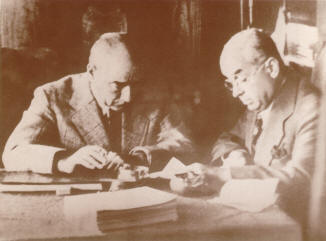 At Ataturk's
request, Mahmut Celal once again became Minister of Economy, serving from
1932 to 1937. During this period of mixed economy with private initiative,
textile, sugar, paper and steel factories as well as many industrial
establishments, power plants, banks (such as the Halk Bank, Sumerbank and
Eti Bank), and insurance companies were established.
At Ataturk's
request, Mahmut Celal once again became Minister of Economy, serving from
1932 to 1937. During this period of mixed economy with private initiative,
textile, sugar, paper and steel factories as well as many industrial
establishments, power plants, banks (such as the Halk Bank, Sumerbank and
Eti Bank), and insurance companies were established.
When the 1934 law requiring Turks to adopt a surname was passed, Ataturk gave the name of Bayar to Mahmut Celal.
PRIME MINISTER
Celal Bayar became Ataturk's last prime minister in 1937. Ataturk's comments on the government's program was: "Bayar, I read your program. It is very promising. May it serve its good purpose. I wish success to all of you and hope that you will find the best solutions to accomplish it." After Ataturk’s death on 10 October 1938, Bayar remained prime minister until resigning in 1939, retaining his seat in Parliament representing Izmir until 1945.
A FOUNDER OF THE DEMOCRAT PARTY
 In 1945,
with three other members of Parliament (Refik Koraltan from Icel, Fuat
Koprulu from Kars and Adnan Menderes from Aydin), Bayar submitted a proposal
to the Republican Peoples Party group to amend the laws regarding party
representation in the Parliament. At this time, only one party was
represented in the Parliament. This proposal would have made the bylaws of
the Parliament and the political rights and freedom of members and parties
more compatible with the spirit of the Constitution. In the history of
Turkish democracy this proposal, submitted on 12 June 1945, became known as
the "Proposal of the Four." This proposal was wholly rejected by the
Republican Peoples Party and on 25 September 1945 Fuat Koprulu and Adnan
Menderes were expelled from the party. When Refik Koraltan was also expelled
from the Party Celal Bayar resigned from Parliament and founded (with Fuat
Koprulu, Refik Koraltan and Adnan Menderes) a new political party, the
Democrat Party, in 1946. This was the beginning of a multi-party system in
Turkey. In the general elections held On 14 May 1950 the Democrat Party won
the majority of the seats in Parliament.
In 1945,
with three other members of Parliament (Refik Koraltan from Icel, Fuat
Koprulu from Kars and Adnan Menderes from Aydin), Bayar submitted a proposal
to the Republican Peoples Party group to amend the laws regarding party
representation in the Parliament. At this time, only one party was
represented in the Parliament. This proposal would have made the bylaws of
the Parliament and the political rights and freedom of members and parties
more compatible with the spirit of the Constitution. In the history of
Turkish democracy this proposal, submitted on 12 June 1945, became known as
the "Proposal of the Four." This proposal was wholly rejected by the
Republican Peoples Party and on 25 September 1945 Fuat Koprulu and Adnan
Menderes were expelled from the party. When Refik Koraltan was also expelled
from the Party Celal Bayar resigned from Parliament and founded (with Fuat
Koprulu, Refik Koraltan and Adnan Menderes) a new political party, the
Democrat Party, in 1946. This was the beginning of a multi-party system in
Turkey. In the general elections held On 14 May 1950 the Democrat Party won
the majority of the seats in Parliament.
PRESIDENT
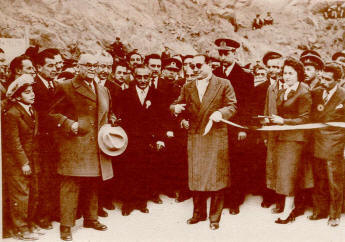 On 22
May 1950, Celal Bayar was elected President of the Turkish Republic, with
Adnan Menderes his prime minister. Shortly thereafter Turkish troops fought
in the Korean War and Turkey became a member of NATO. During this period of
Democrat Party rule Ataturk's edict "Peace at Home, Peace on Earth" was the
guideline, and relations with neighbors and other countries were improved by
reciprocal contacts and visits. Celal Bayar visited the United States of
America and addressed a joint session of Congress, the first Turkish
statesman to address this body.
On 22
May 1950, Celal Bayar was elected President of the Turkish Republic, with
Adnan Menderes his prime minister. Shortly thereafter Turkish troops fought
in the Korean War and Turkey became a member of NATO. During this period of
Democrat Party rule Ataturk's edict "Peace at Home, Peace on Earth" was the
guideline, and relations with neighbors and other countries were improved by
reciprocal contacts and visits. Celal Bayar visited the United States of
America and addressed a joint session of Congress, the first Turkish
statesman to address this body.
Industrialization by joint government-private ventures became his economic policy between 1950 and 1960. While heavy industry was being created by the government the private sector was being encouraged to industrialize. During this period the Turkish gross national product rose by eight percent each year.
The 1954 general elections increased the Parliamentary majority for the Democrat Party and in the early elections of 1957 the Democrat Party won more than two-thirds of the seats. Both times Celal Bayar was elected President of the Republic.
IMPRISONMENT
A military junta staged a coup in 1960 and dissolved the National Assembly. Celal Bayar was arrested, along with the other Democrat Party members of parliament. He is remembered for his dignity and courage at the fake trials of the junta that followed. The junta court passed a death sentence on him and 14 of his colleagues. The sentence of Celal Bayar was later commuted to life imprisonment because of his age, and he was sent to the Kayseri prison. He was released from prison due to ill health in 1964.
LATER YEARS
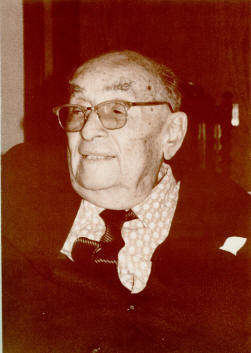 Celal
Bayar remained an important figure in Turkish political life. Leaders and
politicians of the center and the right consulted him and sought his advice
and consent. He stood for the return of the political rights of the
representatives of his party. He wrote his eight-volume autobiographical
history, "And so I Wrote" (Bende Yazdim). He regained his political rights
in 1974 and was invited to become a life Senator in the Parliament, as
allowed by the 1961 Constitution. He declined this so-called right on the
ground that a person represents one's people only when elected by the
people. On the other hand, Bayar was the guest of honor at the ceremonies
held in the Parliament in 1981 on the 100th anniversary of Ataturk's birth.
He was also invited by the Chairman of the Parliament to the ceremonies on
the 65th and 66th anniversaries of the founding of the Turkish Parliament,
23 April National Sovereignty Day, as a living member of the first
Parliament.
Celal
Bayar remained an important figure in Turkish political life. Leaders and
politicians of the center and the right consulted him and sought his advice
and consent. He stood for the return of the political rights of the
representatives of his party. He wrote his eight-volume autobiographical
history, "And so I Wrote" (Bende Yazdim). He regained his political rights
in 1974 and was invited to become a life Senator in the Parliament, as
allowed by the 1961 Constitution. He declined this so-called right on the
ground that a person represents one's people only when elected by the
people. On the other hand, Bayar was the guest of honor at the ceremonies
held in the Parliament in 1981 on the 100th anniversary of Ataturk's birth.
He was also invited by the Chairman of the Parliament to the ceremonies on
the 65th and 66th anniversaries of the founding of the Turkish Parliament,
23 April National Sovereignty Day, as a living member of the first
Parliament.
Bayar had three children, Refi, Turgut and Nilufer. During his lifetime he was blessed to have known his seven grandchildren, seven great-grandchildren and his grandson's grandson.
 Celal
Bayar died in Istanbul on 22 August 1986 at the age of 103 after a short
illness, having retained his sharp judgment and strong memory to the very
last. His coffin was taken to Ankara for the State Funeral Ceremonies and
the man who left an indelible mark in the hearts of his people was laid to
rest in his village, Umurbey, attended by people from all walks of life from
across Turkey, current and former members of Parliament, representatives and
heads of political parties, and friends and family.
Celal
Bayar died in Istanbul on 22 August 1986 at the age of 103 after a short
illness, having retained his sharp judgment and strong memory to the very
last. His coffin was taken to Ankara for the State Funeral Ceremonies and
the man who left an indelible mark in the hearts of his people was laid to
rest in his village, Umurbey, attended by people from all walks of life from
across Turkey, current and former members of Parliament, representatives and
heads of political parties, and friends and family.
Click Here
Minutes of the Last Meeting of the Ottoman Parliament

Copyright © 2005 Demirtas Bayar All rights reserved